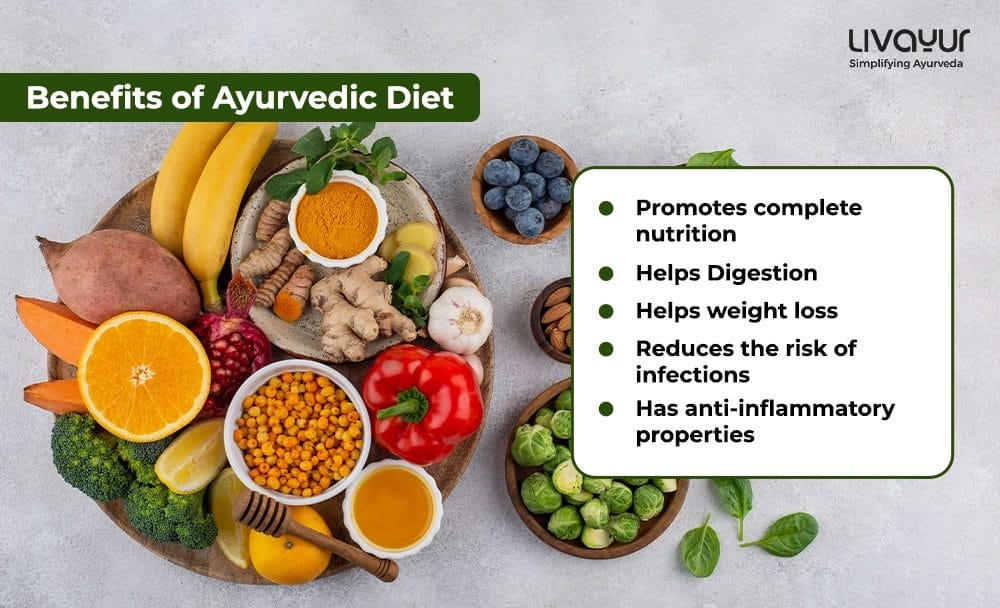
Broadly speaking, an Ayurvedic diet emphasizes balance and moderation, featuring a wide variety of foods. The diet is not restrictive like most fad diets, but the underlying theme is one of balance and harmony with a focus on natural or whole foods. If you dig deeper, you will find that an Ayurvedic diet is also highly personalized, as the underlying concept of Doshas also permeates Ayurvedic food science. While the broad dietary recommendations will offer benefits too, it is best to make appropriate Ayurvedic food choices based on your unique Dosha type or Prakriti. First, let’s take a look at how an Ayurvedic diet works.
How does an Ayurvedic diet work?
Ayurvedic approach to a holistic diet begins at the very root of Ayurveda. Here are a few pointers to understand how an Ayurvedic diet could work wonders for you: [1]
- As per Ayurveda, every body type is governed by one of the three doshas, namely Vata, Pitta, and Kapha. Diet for every individual is planned according to the dosha their body has in excess.
- Each food article either has doshas aggravating or pacifying or balancing action on the human body. To maintain the balance of doshas (health) which are disturbed due to various factors like season, age etc., Ayurveda prescribes a specific diet.
- The food contains six basic tastes (Madhura, Amla, Lavana, Katu, Tikta, and Kasaya) and each taste has a specific effect on every body type or doshas present in the body.
- The food with incompatible or contradictory qualities has a poisonous effect on the body that aggravates Tridoshas, leading to various disorders viz: Gulma (lump), fever, allergic dermatitis, eczema, abscess and other Skin diseases. It also destroys strength, vigour, memory, immunity, etc.
These are the factors that are taken in consideration when deciding upon an Ayurvedic diet for an individual. First step is to determine your dosha. Then, to decide upon a diet, things like your age, dietary preferences, and the seasons are considered.
Ayurvedic Diet Basics [1]
Vata Diet
A Vata Dosha diet should include foods that counter the cooling, drying, light, and active influence of Vata. Therefore, it is advisable to have foods with heating energy, oily and stabilizing effects. As per Ayurvedic food classifications, this means eating foods with sweet, sour, and salty tastes for a Vata diet. In a Vata diet, foods should also be consumed hot or warm to counter the cooling effect of your Dosha and you need to maintain a good intake of water and water-rich foods. Oily and heavy foods are also recommended but in moderation.
Pitta Diet
A Pitta Dosha diet should mainly include foods that have a pacifying effect on your dominant Dosha, countering its qualities of heat, light, intensity, and mobility. Pitta pacifying foods should therefore exert a cooling, drying, and heavy or grounding influence. As per Ayurvedic food classifications, this means that you should focus on foods with sweet, bitter, and astringent tastes. While you need to eat heavy and oily foods with a grounding influence, such foods can cause digestive distress and should therefore be consumed in moderation. For a Pitta pacifying diet, it is also best to avoid consuming foods and beverages at a high temperature, as this can aggravate your dominant Dosha.
Kapha Diet
As should be fairly obvious, a Kapha Dosha diet needs are focused on foods that will counter the effects of your dominant Dosha. As Kapha is characterized by qualities of cold, heaviness, sluggishness, and dullness, Kapha pacifying diet foods should have qualities of heat, light, and drying effects. This means that based on Ayurvedic classifications of food, a Kapha diet should be dominated by foods that have sour, pungent, and bitter tastes. Since heating energy is so essential for a Kapha diet, it is advisable to consume meals warm or extremely hot. Because of the heavy and dulling effect of Kapha Dosha, it is also best to lower your intake of fatty and oily foods. However, fats should not be eliminated completely, as some amount of healthy fat and oil is essential in a balanced diet.
While there are three basic diets for the three Dosha types, there are also individuals with Dosha combination Prakriti, such as Vata Pitta or Vata Kapha, and so on. This makes it important to find out your precise Dosha balance so that you can find a personalized Ayurvedic diet plan, whether you need a Vata Pitta diet, a Pitta Kapha diet, a Vata Kapha diet, or a Tridoshic diet. Moreover, the recommendations provided here are broad guidelines and it is advisable to get more detailed information on specific foods and combinations for your Dosha type from an Ayurvedic physician.
Benefits of Ayurvedic Diet
Ayurvedic diet is based on the principles of Ayurvedic medicine and focuses on balancing the Doshas in the body. Unlike modern diets, the Ayurvedic diet gives personalised recommendations of foods that must be eaten as well as what must be avoided, based on your body type. Here are some of the amazing benefits of an Ayurvedic diet. [1][2]
1. Promotes complete nutrition
It promotes complete nutrition as it features a variety of whole foods such as fruits, veggies, beans, whole grains, nuts, and seeds, while processed food intake is eliminated. Studies suggest that such whole-food diets, with reduced processed food intake, can lower the risk of various lifestyle diseases.
2. Helps Digestion
As Ayurvedic diets include whole foods with good fibre content and are customized to support the digestive function of each Dosha type, such diets lower the risk of gastrointestinal disorders and changes in the gut microbiome that can affect other facets of health.
3. Helps weight loss
Research shows that an Ayurvedic diet can be particularly helpful in promoting weight loss in Pitta and Kapha Dosha types, who are more vulnerable to weight gain and obesity.
4. Reduces the risk of infections
Because of balanced nutrition and improved gut health with an Ayurvedic diet, immune function is also improved, reducing the risk of frequent infections and illness.
5. Has anti-inflammatory properties
As the elimination of processed foods and a focus on whole foods is emphasized in Ayurvedic diets, there is a reduction in systemic or chronic inflammation and reduced toxicity in the body, providing relief from inflammatory conditions like arthritis.
6. Can be personalized to your individual needs
The best part of these diets is that they can be customized to your individual needs, doshas and staple foods. It would be impossible to list all of the benefits of an Ayurvedic diet here or even to explore all of the intricacies of Dosha-specific diets. To truly reap all of the Ayurvedic benefits, you should seek a personalized diet plan that is based on your unique balance of Doshas.
Do’s and Don’t of Ayurvedic Diet [2]
In Ayurveda, the focus isn’t merely on the diet but also on the way you’re consuming your food. Some things that you should and shouldn’t do while eating are listed here below:
Do’s:
- The food should be tasty, warm, qualitative, buttery, and easily digestible.
- It should be eaten neither too fast nor too slow.
- The food should be eaten only when you’re hungry after digesting the last meal.
- The daily diet should include all the tastes—sweet, salt, sour, pungent, bitter, and astringent.
- We should eat food that is nourishing and suitable to our particular needs and requirements, as well as our mental and emotional temperament.
- It is best to focus on food while eating.
- One should eat in a comfortable sitting posture.
- One should always eat in pleasant surroundings with utensils and preparation of individual’s choice.
Don’ts:
- The food should not be contrary to each other in action (prakriti). E.g. fish and milk together, radish and milk together, and honey and ghee in equal quantity.
- One shouldn’t eat in any kind of haste or hurry.
- You shouldn’t eat food too slowly, either.
- Avoid eating, when emotionally distressed.
- Too much use of any of the six tastes is not good for health.
Sample Ayurvedic Diet
To have a truly healthy diet, junk food and foods that promote disease must be avoided. A huge portion of the diet must consist of foods and nutraceuticals that promote health. Nutrient-dense plant foods (vegetables, fresh fruits, beans and legumes, raw nuts, seeds, and avocados), starchy vegetables, whole grains, and phytochemicals that promote health should comprise ninety percent of a daily diet. Here’s a sample diet: [3]
7 am – Kulatha/Mudaga (100 g), Yusha (gruel)
10 am – Buttermilk (200 ml)
1 pm – Yava Chapati (2) + Salad (roots like carrots, knolkhol) + Leafy Vegetable (Spinach / Kale / Broccoli / Fenugreek / Amaranth) 100 g + Vegetables (Beans / Cabbage / Ash Gourd) 100 g
4 pm – Mixed Salad (100 g)
7 pm – Yava Chapati (2) + Salad (roots like carrots, knolkhol) + Leafy Vegetable (Spinach / Kale / Broccoli / Fenugreek / Amaranth) 100 g + Vegetables (Beans / Cabbage / Ash Gourd) 100 g
8 pm – Skimmed Off Milk (200 ml)
FAQs
1. What are the six tastes as per Ayurveda?
Six tastes as per Ayurveda are — Madhura (Sweet), Amla (Sour), Lavana (Salty), Katu (Pungent), Tikta (Bitter), and Kasaya (Astringent).
2. What is Kapha Dosha characterized by?
Kapha is characterized by qualities of cold, heaviness, sluggishness, and dullness.
3. What should be the qualities of Kapha pacifying diets?
Kapha pacifying diet foods should have qualities of heat, light, and drying effects.
Disclaimer
Consultation with a medical expert is advised for personalized dietary adjustments. Do not make any dietary changes based solely on this article.
Conclusion
Embracing an Ayurvedic diet tailored to individual needs and seasonal variations is a holistic approach towards nutrition and dietetics. The emphasis on fresh, easily digestible, and balanced meals not only aids in preventing chronic diseases but also supports weight management and helps foster a positive relationship with food. However, it’s very important to be mindful of the food combinations, adhere to safety precautions, and acknowledge the diverse dietary needs of different age groups.
















